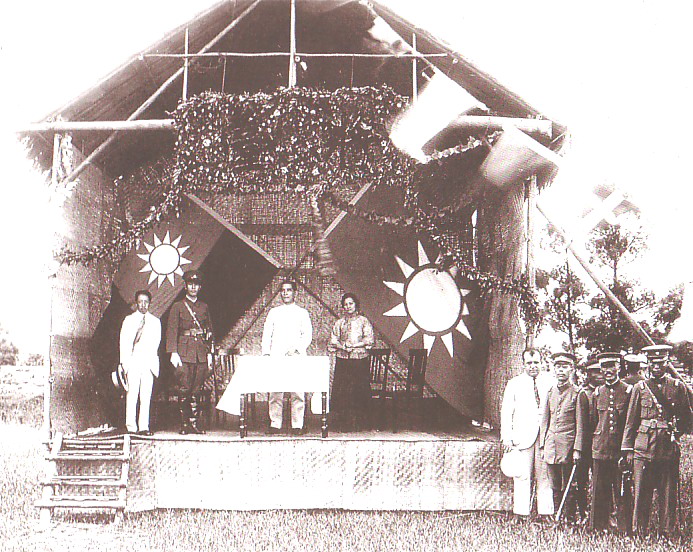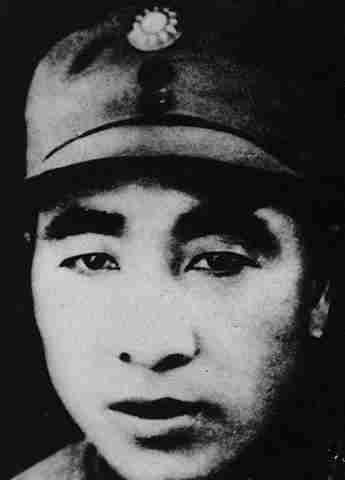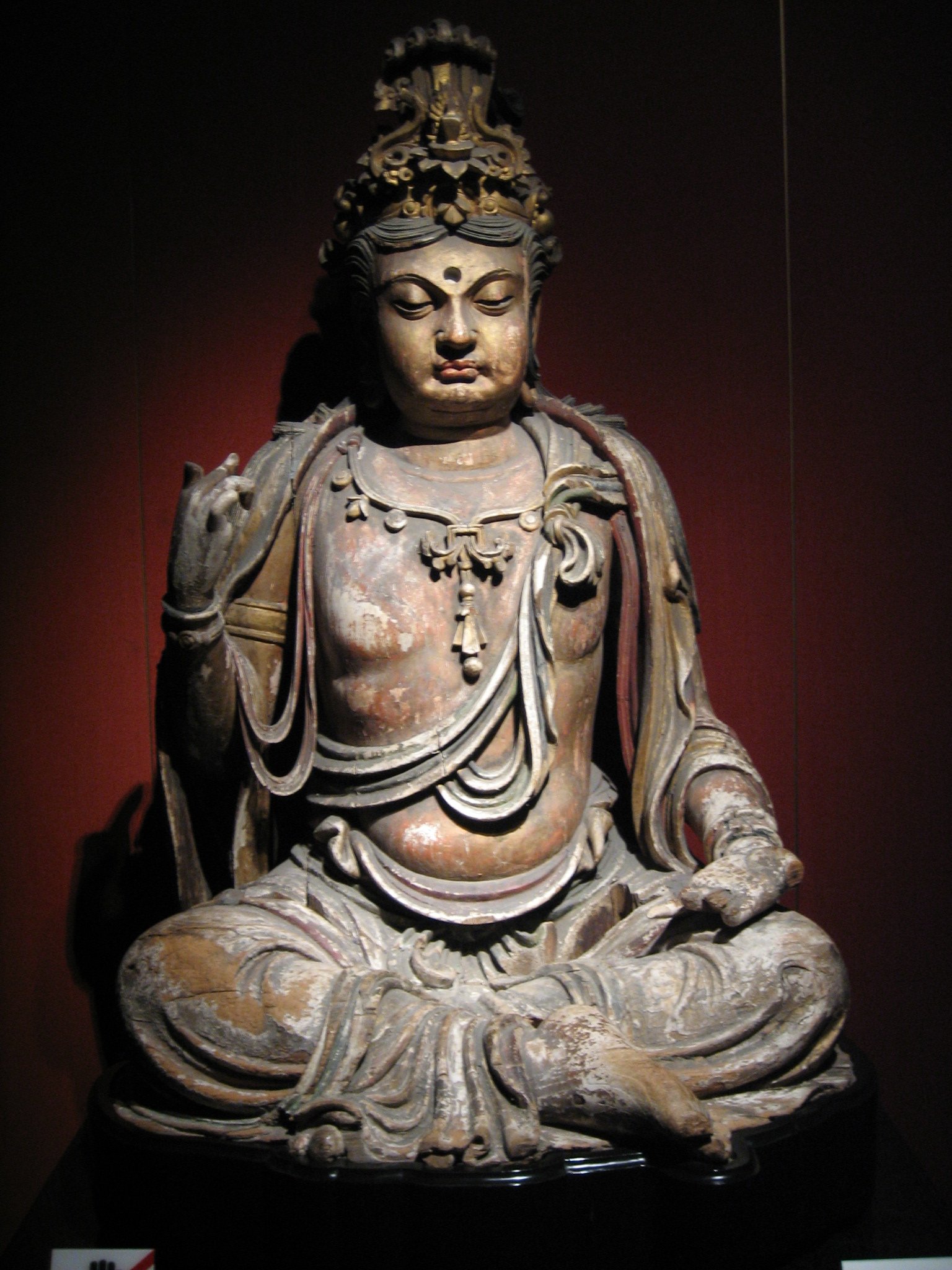|
Du Yuming
Du Yuming (; 28 November 1904 – 7 May 1981) was a Kuomintang field commander. He was a graduate of the first class of Whampoa Academy, took part in Chiang's Northern Expedition, and was active in southern China and in the Burma theatre of the Sino-Japanese War. After the Japanese surrendered in 1945, he was an important commander in the Chinese Civil War. From 1945 to 1947 Du commanded Nationalist forces in Northeast China and won several important battles against Communist forces there, including defeating the Communist general Lin Biao twice at Siping. Despite his successes, Chiang relieved him from command in 1947, after which Communist forces quickly took control of the region. Du was captured later in the civil war and spent a decade as a prisoner of war. He was released in 1959, and given a position in the Communist government. Yang Chen-Ning, who won the Nobel Prize in Physics in 1957, was his son-in-law. Biography Early military career A trusted protégé of Ch ... [...More Info...] [...Related Items...] OR: [Wikipedia] [Google] [Baidu] |
Du (surname)
Du () is a Chinese surname. The name is spelled ''Tu'' in Taiwan. In Hong Kong it is spelled as ''To'' and in Macao as ''Tou'', based on the pronunciation of 杜 in Standard Cantonese, Cantonese. In Singapore and Malaysia, it is spelled as ''Toh (surname), Toh'', based on the pronunciation of 杜 in Hokkien. The Vietnamese equivalent of the surname is Đỗ. However, when diacritics are dropped, it can also be from the Vietnamese surnames Vietnamese name, Dư 余 or Vietnamese name, Dũ 俞 (for both, the Chinese equivalent is Yu (Chinese surname), Yu). It is the 129th surname in ''Hundred Family Surnames'' and is the 42nd most common surname in Mainland China as of 2020. Origin and Branches of ''Du'' (杜) The ancestors of the ''Du'' family are known as the Tangdu. The Tangdu resided southeast of Xi'an in Shaanxi province. The ''Fan (surname), Fan'' (范) and ''Du'' clans share a common ancestor. Some members of the ''Du'' (杜) family are the Tuoba (拓跋) family of Emperor Xia ... [...More Info...] [...Related Items...] OR: [Wikipedia] [Google] [Baidu] |
Campaign To Defend Siping
The Campaign to Defend Siping ( zh, c=四平保卫战) was a struggle between the Nationalists and the Chinese Communist Party (CCP) for the control of Siping in 1946 during the Chinese Civil War. This campaign was characterized by the fact that the supreme commanders of both sides had overestimated their strength and set unrealistic goals, but in both cases, the frontline commanders on both sides averted the potential catastrophes by convincing their respective supreme commanders to change their original decisions. Prelude After the defeat of Jinjiatun Campaign, the nationalists resumed their offensive with vengeance. In a short period of just two days, the nationalists were able to regroup and re-supply completely, and continued their push toward Siping. Chiang Kai-shek was determined to take Changchun after taking Siping, and Mao Zedong was equally determined to hold Siping to the end and prevent the nationalists from taking both Siping and Changchun. Both sides reali ... [...More Info...] [...Related Items...] OR: [Wikipedia] [Google] [Baidu] |
Whampoa Military Academy
The Republic of China Military Academy ( zh, t=中華民國陸軍軍官學校, p=Zhōnghúa Mīngúo Lùjūn Jūnguān Xúexiào, poj=Tiong-hôa Bîn-kok Lio̍k-kun Kun-koaⁿ Ha̍k-hāu), also known as the Chinese Military Academy (CMA), is the service academy for the Republic of China Army. It was founded by the Republic of China as the Whampoa Military Academy at Huangpu (Whampoa), Guangzhou in 1924. At the end of the Chinese Civil War the academy evacuated to the island of Taiwan and took its current name. Its graduates participated in the Northern Expedition, the Second Sino-Japanese War and the Chinese Civil War. Establishment By 1924, the Kuomintang (KMT) wanted to build a modern, and politically reliable armed force. The KMT received money, materiel, and advisors from the Soviet Union; military advisors provided training and began reorganizing the KMT's forces along Soviet lines. As part of the reforms, political commissars were introduced for political and techni ... [...More Info...] [...Related Items...] OR: [Wikipedia] [Google] [Baidu] |
Siping, Jilin
Siping ( zh, s=四平, p=Sìpíng), formerly Sipingjie ( zh, s=四平街, p=Sìpíngjiē, w=Ssupingchieh), is a prefecture-level city in the west of Jilin province, China, People's Republic of China. It has a total population of 1,814,733 inhabitants, as of the 2020 census. Siping covers an area of and is located in the middle of the Songliao Plain, near the border with Liaoning and Inner Mongolia provinces. History Siping's history can be stretched to 3,000 years ago during the Shang dynasty. The Yan (state), Kingdom of Yan Ruins indicate that the Han Chinese People started moving into Northeast region of China during the Spring and Autumn period. Ancient ethnic tribes such as the Buyeo kingdom, Fuyu, the Goguryeo, the Khitan people, Khitans, the Jurchen people, Jurchen, the Mongols, the Manchus, and Koreans have left behind cultural artifacts, including Hanzhou, Xinzhou, and the Yehe Tribe Cultural Artifacts. Yehe Town in Siping is also the hometown of two empresses of the Qin ... [...More Info...] [...Related Items...] OR: [Wikipedia] [Google] [Baidu] |
Lin Biao
Lin Biao ( zh, 林彪; 5 December 1907 – 13 September 1971) was a Chinese politician and Marshal of the People's Republic of China who was pivotal in the Chinese Communist Party, Communist Chinese Communist Revolution, victory during the Chinese Civil War, especially in Northeast China from 1946 to 1949. Lin was the general who commanded the decisive Liaoshen campaign, Liaoshen and Pingjin campaigns, in which he co-led the Manchurian Field Army to victory and led the People's Liberation Army into Beijing. He crossed the Yangtze, Yangtze River in 1949, decisively defeated the Kuomintang and took control of the coastal provinces in Southeast China. He ranked third among the Yuan shuai#People's Republic of China, Ten Marshals. Zhu De and Peng Dehuai were considered senior to Lin, and Lin ranked directly ahead of He Long and Liu Bocheng. Lin abstained from taking an active role in politics after the war ceased in 1949. He led a section of the government's civil bureaucracy as one o ... [...More Info...] [...Related Items...] OR: [Wikipedia] [Google] [Baidu] |
Northeast China
Northeast China () is a geographical region of China, consisting officially of three provinces Liaoning, Jilin and Heilongjiang. The heartland of the region is the Northeast China Plain, the largest plain in China with an area of over . The region is separated from the Russian Far East to the north and east by the Amur, Argun and Ussuri Rivers; from North Korea to the south by the Yalu and Tumen Rivers; and from the neighboring North China to the west by the Greater Khingan Range and Yan Mountains. It is also bounded by the Bohai Bay and Yellow Sea to the southwest, about away from East China's Jiaodong Peninsula across the Bohai Strait, due to be connected via a proposed undersea tunnel. The four prefectures of Inner Mongolia (which is part of North China) east of the Greater Khingan, i.e. Chifeng, Tongliao, Hinggan and Hulunbuir, are sometimes also considered broader parts of Northeast China, and together with the aforementioned three provinces formed what was h ... [...More Info...] [...Related Items...] OR: [Wikipedia] [Google] [Baidu] |
Sino-Japanese War (1937-1945)
The Second Sino-Japanese War was fought between the Republic of China and the Empire of Japan between 1937 and 1945, following a period of war localized to Manchuria that started in 1931. It is considered part of World War II, and often regarded as the beginning of World WarII in Asia. It was the largest Asian war in the 20th century and has been described as The Asian Holocaust, in reference to the scale of Japanese war crimes against Chinese civilians. It is known in China as the War of Resistance against Japanese Aggression. On 18 September 1931, the Japanese staged the Mukden incident, a false flag event fabricated to justify their invasion of Manchuria and establishment of the puppet state of Manchukuo. This is sometimes marked as the beginning of the war. From 1931 to 1937, China and Japan engaged in skirmishes, including in Shanghai and in Northern China. Chinese Nationalist and Communist forces, respectively led by Chiang Kai-shek and Mao Zedong, had fought ea ... [...More Info...] [...Related Items...] OR: [Wikipedia] [Google] [Baidu] |
Whampoa Academy
The Republic of China Military Academy ( zh, t=中華民國陸軍軍官學校, p=Zhōnghúa Mīngúo Lùjūn Jūnguān Xúexiào, poj=Tiong-hôa Bîn-kok Lio̍k-kun Kun-koaⁿ Ha̍k-hāu), also known as the Chinese Military Academy (CMA), is the service academy for the Republic of China Army. It was founded by the Republic of China as the Whampoa Military Academy at Huangpu (Whampoa), Guangzhou in 1924. At the end of the Chinese Civil War the academy evacuated to the island of Taiwan and took its current name. Its graduates participated in the Northern Expedition, the Second Sino-Japanese War and the Chinese Civil War. Establishment By 1924, the Kuomintang (KMT) wanted to build a modern, and politically reliable armed force. The KMT received money, materiel, and advisors from the Soviet Union; military advisors provided training and began reorganizing the KMT's forces along Soviet lines. As part of the reforms, political commissars were introduced for political and techni ... [...More Info...] [...Related Items...] OR: [Wikipedia] [Google] [Baidu] |
Kuomintang
The Kuomintang (KMT) is a major political party in the Republic of China (Taiwan). It was the one party state, sole ruling party of the country Republic of China (1912-1949), during its rule from 1927 to 1949 in Mainland China until Retreat of the government of the Republic of China to Taiwan, its relocation to Taiwan, and in Taiwan Martial law in Taiwan, ruled under martial law until 1987. The KMT is a Centre-right politics, centre-right to Right-wing politics, right-wing party and the largest in the Pan-Blue Coalition, one of the two main political groups in Taiwan. Its primary rival is the Democratic Progressive Party (DPP), the largest party in the Pan-Green Coalition. As of 2025, the KMT is the largest single party in the Legislative Yuan and is chaired by Eric Chu. The party was founded by Sun Yat-sen in 1894 in Honolulu, Hawaii, as the Revive China Society. He reformed the party in 1919 in the Shanghai French Concession under its current name. From 1926 to 1928, the K ... [...More Info...] [...Related Items...] OR: [Wikipedia] [Google] [Baidu] |
Yang Chen-Ning
Yang Chen-Ning or Chen-Ning Yang (; born 1 October 1922), also known as C. N. Yang or by the English name Frank Yang, is a Chinese theoretical physicist who made significant contributions to statistical mechanics, integrable systems, gauge theory, and both particle physics and condensed matter physics. He and Tsung-Dao Lee received the 1957 Nobel Prize in Physics for their work on parity non-conservation of weak interaction. The two proposed that the conservation of parity, a physical law observed to hold in all other physical processes, is violated in the so-called weak nuclear reactions, those nuclear processes that result in the emission of beta or alpha particles. Yang is also well known for his collaboration with Robert Mills in developing non-abelian gauge theory, widely known as the Yang–Mills theory. Early life and education Yang was born in Hefei, Anhui, China. His father, (; 1896–1973), was a mathematician, and his mother, Meng Hwa Loh Yang (), was a house ... [...More Info...] [...Related Items...] OR: [Wikipedia] [Google] [Baidu] |
Order Of Blue Sky And White Sun
Order, ORDER or Orders may refer to: * A socio-political or established or existing order, e.g. World order, Ancien Regime, Pax Britannica * Categorization, the process in which ideas and objects are recognized, differentiated, and understood * Heterarchy, a system of organization wherein the elements have the potential to be ranked a number of different ways * Hierarchy, an arrangement of items that are represented as being "above", "below", or "at the same level as" one another * an action or inaction that must be obeyed, mandated by someone in authority People * Orders (surname) Arts, entertainment, and media * ''Order'' (film), a 2005 Russian film * ''Order'' (album), a 2009 album by Maroon * "Order", a 2016 song from '' Brand New Maid'' by Band-Maid * ''Orders'' (1974 film), a film by Michel Brault * "Orders" (''Star Wars: The Clone Wars'') Business * Blanket order, a purchase order to allow multiple delivery dates over a period of time * Money order or postal or ... [...More Info...] [...Related Items...] OR: [Wikipedia] [Google] [Baidu] |






